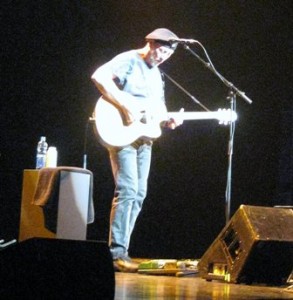MAHAIWE PERFORMING ARTS CENTER
GREAT BARRINGTON, Mass.
RICHARD THOMPSON
Sunday, October 25, 2008
Review by Seth Rogovoy
(GREAT BARRINGTON, Mass.) — If singer-songwriters were scotch whisky, Richard Thompson would be one of those rare, expensive single-malts, appreciated only by true connoisseurs. (John Mayer, on the other hand, would be Dewar’s.)
In his solo performance at the Mahaiwe last night, Thompson demonstrated his remarkable, distinctive characteristics: the fleet, orchestral guitar playing; the gruff but passionate vocals; the acerbic, sometimes astringent, wit; the modal-based folk-rock; and how all these unique flavors (like the peat, the smoke, and the burn) blend into the old-fashioned values of vaudeville in his seemingly effortless, generous delivery.
Like Laphroaig, Thompson is an acquired taste. But those who acquire it are forever enriched (and forever ruined for the John Mayers or Jackson Brownes of the world). An incisive lyricist and composer, Thompson’s music is mostly built on the drones and modes of Anglo-Celtic folk–the same modes and drones, however, upon which most non-Western music is built. As a result, to the Western ear expecting blues changes or scalar melodies, it can be hard at times to recognize Thompson’s melodies or musical strategies — his songs seem to lack melodies to follow.
But Thompson’s strategy is the perfect marriage of form and content. Just as his songs shy away from the banalities of so much pop and blues in favor of examinations of the dark corners of love, loss, and regret, his music supports the grim and gloomy, sometimes twisted and violent viewpoint.
This is all, of course, leavened with a good dose of humor, albeit some of it black, and Thompson’s shimmering guitar approach, a miraculous one-man band in which guitar functions as drum, bass, rhythm and lead instrument all at once.
Thompson knows how to pace a concert, balancing fan favorites like the opener, “I Feel So Good” (think Warren Zevon’s “Excitable Boy”) with new material such as “Dad’s Gonna Kill Me” (not a family drama, but an Iraq war protest song, “dad” here being short for Baghdad) and a few jazzy or rock-based novelty tunes thrown in for relief from the serious tension Thompson builds.
A gracious performer in spite of his sarcastic wit, Thompson can seem timeless in his musical and lyrical concerns and then toss off a mention of iPhones and Wikipedia to startle listeners into the present. He also got the primed, sold-out crowd to participate in several sing-alongs, but wasn’t above making fun of them in the process.
Like his contemporary, Joni Mitchell, who similarly began playing traditional folk before establishing a style built upon that but all her own, along the way becoming the most influential female singer-songwriter of the rock era while remaining a musician’s musician (in spite of a few hits), Thompson’s influence can be felt throughout singer-songwriters since the late-1970s. Elvis Costello is unimaginable without Thompson, as are Jeff Buckley, Shawn Colvin, and Ani DiFranco.
Who knows — maybe even late at night, when he’s looking for inspiration to take him places he’s never dreamed of going on his own, John Mayer listens to Richard Thompson.

